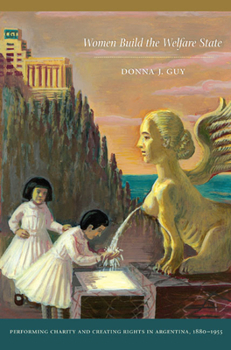Women Build the Welfare State: Performing Charity and Creating Rights in Argentina, 1880-1955
In this pathbreaking history, Donna J. Guy shows how feminists, social workers, and female philanthropists contributed to the emergence of the Argentine welfare state through their advocacy of child welfare and family-law reform. From the creation of the government-subsidized Society of Beneficence in 1823, women were at the forefront of the child-focused philanthropic and municipal groups that proliferated first to address the impact of urbanization, European immigration, and high infant mortality rates, and later to meet the needs of wayward, abandoned, and delinquent children. Women staffed child-centered organizations that received subsidies from all levels of government. Their interest in children also led them into the battle for female suffrage and the campaign to promote the legal adoption of children. When Juan Per n expanded the welfare system during his presidency (1946-1955), he reorganized private charitable organizations that had, until then, often been led by elite and immigrant women.
Drawing on extensive research in Argentine archives, Guy reveals significant continuities in Argentine history, including the rise of a liberal state that subsidized all kinds of women's and religious groups. State and private welfare efforts became more organized in the 1930s and reached a pinnacle under Juan Per n, when men took over the welfare state and philanthropic and feminist women's influence on child-welfare activities and policy declined. Comparing the rise of Argentina's welfare state with the development of others around the world, Guy considers both why women's child-welfare initiatives have not received more attention in historical accounts and whether the welfare state emerges from the top down or from the bottom up.
Format:Paperback
Language:English
ISBN:0822343304
ISBN13:9780822343301
Release Date:January 2009
Publisher:Duke University Press
Length:264 Pages
Weight:0.85 lbs.
Dimensions:0.7" x 6.1" x 9.1"
Customer Reviews
0 rating





